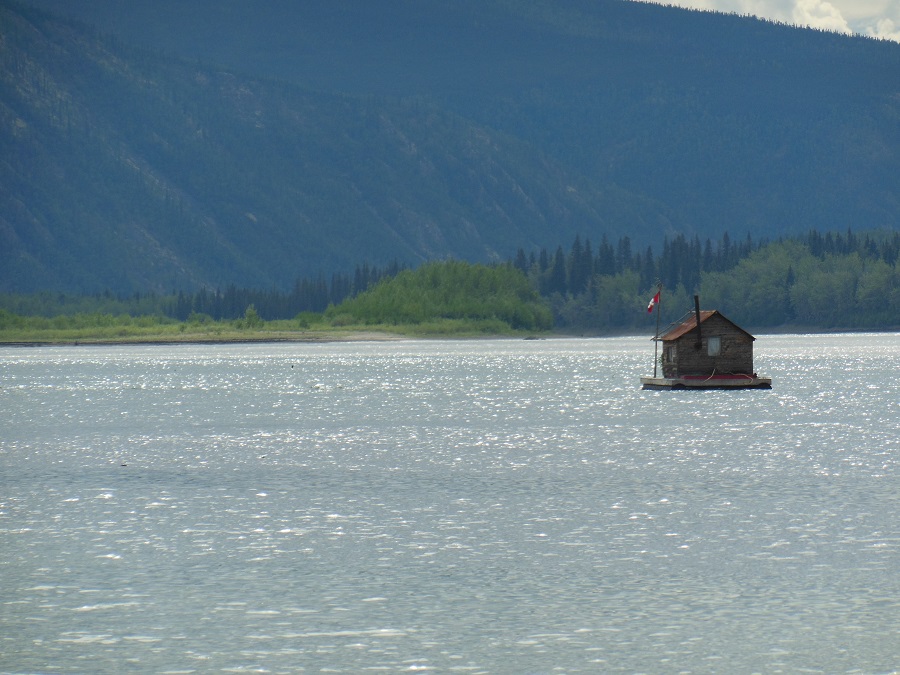They have cradled you in custom, they have primed you with their preaching,
They have soaked you in convention through and through;
They have put you in a showcase; you’re a credit to their teaching.
But can’t you hear the Wild? – it’s calling you.
(Robert W. Service, The Call of the Wild)
“Eighteen years ago, my husband brought me here
kicking and screaming,”
she told me after I asked her how long
she has been living in Beaver Creek, Yukon,
Canada’s westernmost community,
population 103.
“We were living in Ontario and one day he says to me,
‘Honey, I have a Yukon soul, and I won’t be happy until I move there.’”
She hated Beaver Creek,
in the beginning anyway.
But after nearly two decades,
a year after her husband’s death by cancer,
she is still here.
“I drive to Whitehorse once a month to get my groceries.”
Whitehorse is a five-hour drive, one way.
“And I usually go there and back in the same day.”
I asked about fresh fruit and vegetables.
“I pick up a few things and they last me a couple of days,
and then the rest of the month it’s canned stuff.”
I thought about what that would mean for me
if I were still living in Edmonton, Alberta.
It would mean I would have to drive to Lethbridge
just to get my groceries. Whew!
In Dawson City, the young French-Canadian man
told me he came here seven years ago for a vacation.
When he returned home,
he spent the next two years trying to figure out
how he could come back to Dawson City permanently.
He’s been here five years now,
holds two jobs,
just bought a house last year,
and intends to be here indefinitely.
The young woman in Whitehorse arrived seven years ago
with her boyfriend, now husband.
“I tried to move back to Saskatoon one time,” she told me,
“but I only lasted a day and I turned right around
and came back to the Yukon.”
What’s the draw of the Yukon?
Why would someone live
where she has to drive five hours
just to buy her groceries?
These people are not loners,
living in remote areas of the wilderness,
gums turning black with scurvy,
greeting visitors with a wary eye
and a loaded shotgun.
No, they are rational, social people who,
for reasons they don’t quite understand themselves,
opted to give up the relative ease that can be found
in living in (or near) the larger Canadian urban centres.
There’s only one reason for this, of course.
The benefits of being in the Yukon,
as they see them, outweigh the benefits
of not living in the Yukon.
Could it be that the comfort and ease
most of us work toward in life
are chains and shackles to the wilderness spirits
that inhabit residents of the Yukon?
After a hard day’s work,
perhaps a hike to the top of Midnight Dome
to watch the sun set at midnight
is a more calming influence
than late-night television.
They will tell you they come here
for the open spaces,
for the hiking,
for the fishing,
for the work.
Those are macro reasons.
But I think it’s the rarely-articulated micro reasons
that really make the difference.
It’s the sound of water moving through rock.
The pure sound,
without the background hum of traffic.
It’s the sight of mountains,
still fresh with snow.
It’s the sound of the stillness,
the smell of cedar-filled air,
the touch of cold on exposed skin in winter.
It’s fireweed glistening with morning dew,
the sight of mama grizzly and her cubs
eating berries along the treeline,
the facial glow from sitting near a wood-burning stove.
As you well imagine,
the Yukon isn’t for everyone.
Not everyone who comes here wants to stay
(there have been divorces when one spouse wants to return south),
and not everyone born here wants to remain.
One does not have to be physically robust to live here,
just fit enough.
The days of necessarily carrying
back-breaking 100-pound loads along the trail
are in the past.
But yet, to live here
takes a certain amount of resilience.
In Jack London’s book,
A Daughter of the Snows,
the protagonist, Frona Welse, meets a man on the trail
during the Yukon Gold Rush.
He is wallowing in self-pity
because his comrades have abandoned him
for not keeping up.
After Frona determines that this man is no less
physically capable than his friends, she says,
“My friend, you are as strong as they.
You can work just as hard as they;
pack as much.
But you are weak of heart.
You cannot work like a horse because you will not.
Therefore the country has no use for you.
The north wants strong men –
strong of soul,
not body.
The body does not count.”
There is something about the Yukon
that has been inside people
since the Gold Rush,
perhaps even much longer.
It’s the idea that with diligence and hard work,
one can still find one’s fortune here,
perhaps not a fortune in gold,
but fortune nevertheless.
I think people come here to test their mettle.
One might say they have come here to find themselves.
And that just means that they have opted
to free themselves from the conveniences
of their previous lives,
strip themselves of the layers of their former selves,
and to peek inside.
And if they find
that what’s inside is strong enough
and to their liking,
they will stay.
